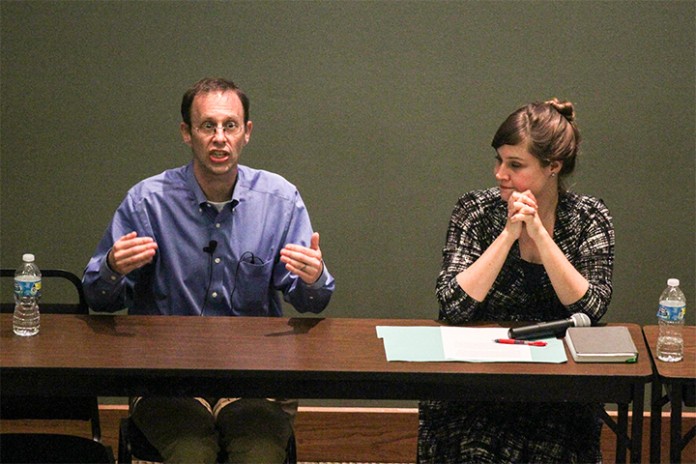
The College of Arts and Sciences held a STEM & Humanities Symposium on Thursday at the Mayborn Science Theater. The event featured a number of faculty members, both visiting and from Baylor.
Department chair and French professor, Dr. Heidi Bostic, served as the moderator for the faculty panel and gave opening remarks.
The symposium touched on a number of environmental issues and brought to light the work already being done to combat world issues. Bostic said she hopes that it will encourage students in their fields.
“This symposium actually has several goals, one of which is to highlight the really great interdisciplinary work already happening at Baylor. It’s also to galvanize future research —get students more interested in realizing that the research we do, and the learning we do, in classes has a real world implications,” Bostic said.
The theme of the faculty panel discussion was “The Anthropocene from Where I Stand.” The Anthropocene is an interdisciplinary journal that is based on the significant effects that humans have made and will make on Earth’s ecosystems and geology.
Dr. Anne Chin, professor of Geology and Environmental Science at the University of Colorado and editor-in-chief for the Anthropocene, gave a keynote speech on reasons to care about the journal.
Following the speech, four Baylor professors gave an introductory synopsis of their feelings on the topic. Included in the panel was Dr. Joseph Ferraro, associate professor of Anthropology; Dr. Julia Daniel, assistant professor of English; Dr. Christie M. Sayes, associate professor of Environmental Science and Toxicology; and Dr. Paul Martens, associate professor of Religion. The floor was then opened for questions and comments. Those who commented ranged from college students to professionals.
Martens said the participation of college students helps them more fully understand their future in the field.
“I think at Baylor we have a lot of incredibly well-intentioned young students who don’t quite understand where they fit in the larger cultural, social and political framework in which they live,” Martens said. “Conversations like this help them understand that and the benefits and responsibilities that emerge from that.”
Following the panel, Dr. Peter Hotez, dean for the National School of Tropical Medicine, professor of Pediatrics and Molecular Virology and Microbiology at Baylor, spoke on “Neglected and Emerging Infections in the Anthropocene.”
Garland Texas junior Kaitlyn Hoffman was present at the symposium. The issues based on geologic records and the growth of science drew Hoffman’s attention. She said she feels that events like this help encourage scientists to reach out.
“Scientists can’t stick in our little laboratories all the time. We have to go out to the public and make other people understand that there are things out there that the media or celebrities don’t talk about. They should be aware and get involved as well,” Hoffman said.
As the head of the department, Bostic hopes that events like the symposium encourage students of different paths, not just those who study the environment.
“[We work to get] students excited in the notion that their studies can have an afterlife in their future, and that it’s not just natural sciences that can have an impact on the world,” Bostic said. “It’s humanists, it’s social sciences, it’s fine artists. Across the spectrum of disciplines we can find ways to make a difference.”





